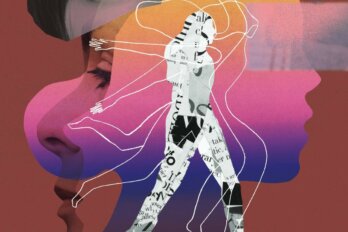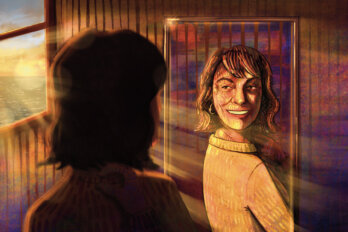Not last May but the one before, my mother was laid off from her job as a document manager for a Calgary energy firm. It was a Wednesday afternoon, and I called my parents to ask my father a question about the car. He works from home, and I was surprised when my mother answered.
Her voice was heavy and exhausted. “I was let go today.”
I didn’t know what to say, so I said nothing at all.
She cursed softly. “What am I going to do, Richard?”
I stood up from my chair and, through my basement suite’s thin window, watched two magpies tug-of-war a ribbon of intestine above a run-over squirrel. I asked if dad was there.
“No,” she replied. “He’s been at a customer’s house all morning. I still have to tell him.”
I was the first to know—aside, of course, from my mother, her boss, and an HR rep.
After we hung up, I pictured her at home at noon on a Wednesday: sitting upright on the couch, sipping cranberry juice, watching a PVRed episode of Coronation Street. And as Mike drowns himself with a sailboat anchor and his wife Gail is then charged with his homicide, the TV’s light flickers across her glasses.
You expect yourself to be a failure, but your own mother?
After I was born and my brother, Tress, turned one, my mother went back to work and my father stayed home. In Lake Bonavista, our paradisal Calgary suburb, the news of my mother’s bread winning was met with a mixture of shock and shunning: much in the way as if someone had married a cat.
Calgary’s Child, a newsletter delivered to every single-family dwelling in town, ran an article about my father titled “Man about the House.” The tag line reads, “Rick Kemick, stay-at-home dad, is a man with a plan and his family is thriving on the results.” The ensuing story is built off the novelty of an adult male baking an apple pie. “My colleagues say I’m lucky,” my mother is quoted as saying, completely negating my father’s admission—not a hundred words earlier—that “every afternoon, he takes a 45-minute nap while the boys tidy up, vacuum, and sweep.”
Here is where my mother and I part ways. I don’t see her as lucky but rather as holding the short side of the wishbone, saying, “Just enough for broth.” I want her to be hungry, ambitious, feral. I want her to feast on the blood of her enemies, to wear their fingers like earrings. I want her to tell Calgary’s Child that she—a woman running the province’s pipelines—is the real story and not some guy whose “buddies are jealous of his lifestyle and want to know how much money his wife makes.” I want my mother to not be a mother at all.
This past Mother’s Day marked her year of unemployment. On this anniversary, for the first time, she asked for a gift. “I want to go bowling,” she told me over tea.
“People still do that?” I replied.
The Chinook Bowladrome looks exactly like you’d expect: fading pastels, beige hardwood, cartoons of humanized pins taking orgasmic pleasure in being rammed into submission.
But what I wasn’t expecting was the alley to be packed with prepubescent teenagers, there for a youth-league tournament. I had told my mother that we didn’t need reservations because “nobody fucking bowls anymore,” and now I have to beg the manager for a lane.
My parents arrive with apologies. “We got lost in the mall,” my mother says, and my father adds, “Do you know there’s a store that only sells board games?”
At the register, we swap our shoes, and the cashier asks me to jot down the names of our party so he can log them into the lane’s overhead computer. I write mine first; then, since I am named after my father and my own name is fresh in my head, I write his; then my mother’s.
At our lane, I’m stretching my wrists when the computer flicks on. The woman of the hour will be last in line.
There was a small group of stay-at-home moms who ran Lake Bonavista like a fiefdom. They organized bake sales and penned passive-aggressive editorials in the Bonavista Bugle calling out those in contempt of the community’s “front lawn expectations.”
And while these women met my father’s matriarchal calling with a certain amount of humour, curiosity, and even lust, they were not as kind to my mother. When my parents hired a weekly cleaning lady—a chain-smoker named Shirley—the news spread quickly. One of the oligarchical matrons saddled up beside my mother at Tress’ hockey game. “Kelly,” the woman said, “your husband cooks and someone else cleans.” She feigned laughter. “What do you do?”
My mother, who had rushed to the rink from work to watch my brother lumber six strides behind the play, looked down the bleachers at me. I, who was seven at the time and had developed a fondness for eating paper, slipped another napkin into my lower lip like chewing tobacco. My mother smiled. Her mascara had clumped her eyelashes, her earlobes hung heavy with fool’s gold, and I glimpsed the exhausting nature of affection. I smiled back and abandoned her to judgement, my lips fat with pulpy mess.
Before I left for the bowling alley, my friend Donna (a mother herself) suggested I pick up a gift. “But the bowling is the gift,” I defended.
“What’s her favourite wine?” she asked.
I shrugged. “Red?”
“Her favourite cheese?”
“Whiz?”
“What about a bouquet of daisies?”
I responded by leaving the room.
Halfway through our match, I’m shooting the game of my life, and after each strike (of which there are many) I turn my hands into pistols and shoot the fallen pins. My father was decent at first, but he’s fading. He’s begun rolling the ball so gently that when it does make contact, the pin tips over like a starlet fainting onto a chaise lounge.
My mother is deep last. At one point the computer screen—which shows cartoons to recap the past shot—starts playing the gutter ball graphic only to glitch halfway through. The screen freezes with an image of a single pin, as if to say, “Goddammit woman, this is what you are aiming for.”
I nail another strike and high-kick the air. I take the seat beside her as my father begins his frame.
When I was growing up, all my mother and I did was talk. As she chaperoned me through gridlock to my acting classes, we spent hours chatting about my school, my friends, my inevitable success. One night, after arriving early to pick me up from the theatre, she watched all of the other young thespians say goodbye to each other, leaving me forgotten in the wings. The next day, she checked-out a book-on-tape: How to Be a Social Butterfly. Inching through the merge lane, we’d pause the cassette and rehearse scenes to each other. “May I coax you with another slice of carrot cake?” she would ask, offering me an imaginary plate.
“Why thank you,” I’d respond, immediately complimenting the texture. “And have you met my friend, Harold? He is an astronaut, like your husband.”
I remember two pieces of advice from How to Be a Social Butterfly. The first is when you’re holding an empty glass and someone makes a toast, it is polite to raise your glass but impolite to mime a sip. The second is when someone offers a politically-charged observation, the best way to defuse the situation is with the ambiguous line, “These are troubled times.”
But here, watching my father’s bowling ball tiptoe down the lane like a pickpocket, I sit beside my mother and don’t know what to say. Without work to ask about, I haven’t a clue. She’s still interested in my life, but I’m not. I know that if a younger version of myself looked forward in time to see me, he’d be disappointed: the pointless degrees, the floundering ambition, the notebook filled with the titles of novels I’ll never write.
Sitting separate on the bowling alley’s unupholstered chairs, we fidget with our shoes. She clears her throat. “I think I have to start volunteering.”
I nod. “These are troubled times.”
When my brother and I started elementary school, my mother began waking us up before she left for work and made us chant the lines, “I am beautiful. Something great will happen to me.” If she felt we needed an extra boost, we were then told to repeat—in a sing-song voice—“K-E-M, I-C-K. Kemicks are the best today.” This last part is what I credit with my small yet indomitable belief that our family is, when it comes down to it, superior to everyone else. We’re taller, smarter, and fiscally ruthless. We parallel park and clean as we cook. We get credit cards only for the welcome points. We pour wine right to the brim and send emails composed entirely in the subject line. We floss. We’re social motherfucking butterflies.
My mother would often not return from work until well after my brother, I, and even my father had gone to bed. One night, I couldn’t sleep because my grade one show-and-tell was the following day, and I was having doubts about the mass appeal of my Fleetwood Mac CD. I descended the stairs for some scrap paper to find her on the good couch, the one my father only allowed guests to sit on. She was crying.
I cuddled beside her, and she told me she was having trouble at work. I suggested she get dad to cut down a tree, march into her office, and beat everyone to death. What’s changed since then? I now understand my father’s profession (he’s a cabinetmaker), but I’m still unsure of my mother’s. There was the half-decade I thought she built computers, the class project where I said she pumped gas, the year I told people she worked at the railroad (and to be clear, the railroad year was not conceived in the ignorance of childhood but when I was twenty-three).
The morning of my show-and-tell, she woke my brother and me. I was too tired, so she helped me through: “You are beautiful,” she said. “Something great will happen to you.”
My mom has the final frame of the match, but there’s nothing riding on it. I’ve locked up first, and she has long since acquiesced to a final score in the double digits. She chooses a bright yellow ball, holds it close to her mouth, takes two steps forward, and releases. At first, the ball extends from her with near perfection, its line straight and true. But then, as it spins down the lane, it begins to list. With each unrolling metre, it finds a new way to disappoint her. The ball nudges over the far left pin and disappears.
She goes back to the pen of balls but chooses to wait until the bright yellow one is returned down the track. “Why do you want that ball?” my father asks.
She points at the remaining pins. “Because it got one.”
Last Christmas, I was in my parents’ basement, throwing away memories I didn’t want anymore. I uncovered my mother’s grade thirteen yearbook and immediately flipped to the back to the ungrammatical inscriptions:
Worlds’ greatest drawer!
Lets get Drunk!!!
But the one that snagged my attention was, To the woman with the most sensual kisses.
My mother descended the stairs with tea and cookies. She gasped. “You’re not throwing out your ventriloquist dummy?”
I closed the yearbook and looked up at her. “Who are you?”
After bowling, my father takes us to Orange Julius. As he waits at the register, my mother and I sit in the food court. I default to the one question I promised myself I wouldn’t ask. “How’s the job hunt?”
She scrubs the table with a napkin. “There’s not a lot out there,” she says, making a small pile of salt and sweeping it to the floor. “And what there is, I mean, I look at it and think, This is not my dream.”
“What is your dream?” I ask, and in doing so I realize that the woman who has been asking me that question every day for the past twenty-seven years has never heard it back.
My father returns with three Styrofoam cups. “Did we tell you about the store that only sells board games?”
How well should a child know his parents? Perhaps just enough to assume perfection while knowing better than to actually expect it.
What do I know of my mother? I know she’s in a tough spot right now. But if Kemicks are indeed the best today, why can’t she pull herself out of it? Why can’t I?
In the mall’s parkade, idling alone in my car, I stare at myself in the rear-view mirror. I’m trapped in thought for so long that someone taps their horn to tell me they’re waiting for the space. Backing up, I swivel to see the bouquet of daisies, forgotten on the back seat, a bit crumpled but still stubbornly white.
Somewhere, out ahead of us in the churning and uncertain future, is a day in which the sky will darken, the ground will soften to quicksand, and all we will know is failure. As a child, this day—the inevitability of it—terrified me. I would wring my hands white, just waiting to be miserable. And with every setback—flunking a swimming test, losing a five dollar bill, an unsuccessful audition to Cats—I would peer out the window to the sky and whisper, “Has it finally arrived?” But after each shortcoming, my mother would slide Rumours into the Buick’s CD player, and I’d be forced to admit that today was not the day.
I am more at ease now. Because ever since not this last May but the one before, I’ve been seeing that after the dark day has hit and moved on, there’s just the non-returnable opportunity of rebuilding a life once thought complete: the canvas-clean blankness of troubled times.
Before I exit the mall’s garage, I throw the car in park and run around to tend to the flowers, buckling them upright and secure. Back in the driver’s seat, I readjust the rear-view so I can keep an eye on them for the entire ride home.
A version of this essay can be heard on CBC’s The Doc Project.




